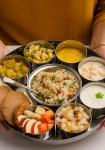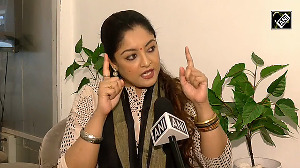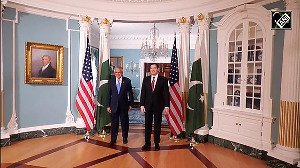 ‘Mainstream politics and separatists operate simultaneously in the valley. So there’s no clear cut verdict as such. It’s always difficult to predict anything.’
‘Mainstream politics and separatists operate simultaneously in the valley. So there’s no clear cut verdict as such. It’s always difficult to predict anything.’
‘It’s not just a parliamentary election. It is a mock test for the assembly polls in December.'
‘The PDP hasn’t shown much maturity in tackling the issues that affect its ranks.’
Bikash Mohapatra presents a kaleidoscope of views from Jammu and Kashmir, where the five-phase polling for its six seats ended last week.
Umar Habib, a tourist guide in Anantnag district, Jammu and Kashmir, had no doubt when it came to his choice of party.
“I voted for the People’s Democratic Party,” he said.
“Whatever work the Abdullahs (Farooq and Omar) have done it has been in and around Srinagar. We haven’t benefitted from the National Conference government in any way,” he explained, making clear the reason for his decision.
But Shaikh Mushtaq, a trader in Srinagar, believed the ruling party deserved another chance and cast his vote accordingly.
“Omar’s intentions are good,” he explained, adding, “As the chief minister he has done his bit.
“It’s just the older generation surrounding him -- mostly his father’s contemporaries (cronies) -- who stand in his way, giving him wrong advice more often than not.”
Ghulam Nabi Ahmed, a graduate looking to set up his own business, had no such considerations.
“You cannot trust any party,” he lamented, admitting he didn’t vote.
“No one bothers about the people. Every one is focused on his own political gain.”
It is voices like the above that signify the public perception in the sensitive state of Jammu and Kashmir.
The state, which witnessed the five-phase polling to its six parliamentary constituencies end last week (May 7), witnessed an average turnout of less than 50 per cent.
“No government is going to be completely effective in Kashmir because of the conflict situation,” explained Prof Noor Baba, an eminent political commentator.
“With the passage of time people have also started realising this limitation of the ‘would-be’ government,” he continued, adding, the verdict, therefore, will always remain fractured.
“There will be a division of vote -- there’s always a constituency for separatists in the state. But most people who have voted want to be part of the establishment.
“As such the alliance between the Congress and the National Conference should be the winning combination.”
In the 2009 election, the National Conference won three seats while the Congress was victorious in two, with the other (Ladakh) going to an independent candidate.
Prof Baba, from Srinagar, explained that the ruling alliance stands a chance to benefit again from their existing vote banks.
“In southern Kashmir -- that includes the two constituencies of Jammu and Udhampur -- the Congress continues to remain strong because of Ghulam Nabi Azad (former chief minister and now the Union minister for health),” he explained.
Azad is contesting the Udhampur set against Bharatiya Janata Party’s Dr Jitendra Singh -- and Arshad Malik of the PDP -- while Jammu has two-time Congress MP Madan Lal Sharma up against Jugal Kishore Sharma of the BJP.
“Udhampur consists of assembly segments like Doda, Kishtwar and Bhadarwah and the goodwill that Azad enjoys in these places is going to make an impact on the overall result,” continued Prof Baba, adding, “The National Conference has the edge when it comes to the older generation.
“The party has a committed vote bank so to speak and Srinagar is definitely an NC stronghold.
“Besides, it is difficult to say though how well the PDP is going to do. The party hasn’t shown much maturity in tackling the issues that affect its ranks.”
Prof Rekha Chaudhury, from the department of political science of the Jammu University, made a similar assessment.
“Mainstream politics and separatists operate simultaneously in the valley. So there’s no clear cut verdict as such,” she explained, adding, “It’s always difficult to predict anything.
“While the National Conference has a committed voter base in Srinagar, Anantnag is a PDP stronghold.
“There’ll be communal polarisation in Ladakh, which has opted for independent candidates in the last two polls, and usually the Muslims -- the two independents in the fray this time are from the community -- outvote the Buddhists (the Congress and BJP candidates).
“Baramulla -- where Sharief Ud-Din Shariq of the National Conference is pitted against Ghulam Mohammad Mir from the BJP and Muzaffar Hussain Baig of the PDP -- will witness fragmentation.
“This fragmentation would have been even more had it not been for the alliance between the Congress and National Conference. It’s this alliance that will work to the advantage of the Congress in Jammu, and to that of the National Conference in Kashmir.”
Prof Chaudhury believed the ramification of the Lok Sabha polls will have a considerable impact in December, when the 89 assembly constituencies of the state go to the polls.
“It’s not just a parliamentary election. It is a mock test for the assembly polls in December,” she said. Prof Baba concurred, adding the incumbent have an advantage.
“Omar (Abdullah) has connected to the people in a certain way. By and large people have the opinion that he is more acceptable than the rest.”
Image: Kashmiri women display their ink-marked fingers after casting their votes in Kangan, 40 km east of Srinagar. Photograph: Danish Ismail/Reuters.









